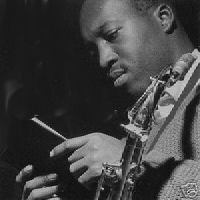![]()
![]()
![]()
![]()
![]()
![]()
![]()
The Turnaround
Rating: 4˝ out of 5 stars
During the late '50s it was common-place for critics to rap the post-bop movement as stagnant, apparently because it didn't make the same dramatic break with bop that bop did with swing. Many of their jibes were ill-founded and have-been implicitly retracted by subsequent articles, but the fact remains that around 1958, the achievements of a number of fine musicians were greatly underrated.
Mobley is certainly one of these. His work has long been a top-notch improviser for years. Unfortunately, the kind of music Mobley plays doesn't receive the attention or create the controversy it once did, so his chances of gaining the recognition he deserves seem, for the time being, rather slim. Meanwhile, he goes on making praiseworthy contributions to one record date after another.
The title tune here is a 50-bar ABA tune with an 18-bar bridge. Turnaround's choppy melody and modified rhythm-and-blues beat are reminiscent enough of The Sidewider to make me think it's an attempt to capitalize on the commercial success of the Lee Morgan hit. Mobley and Harris contribute melodic, well-constructed spots; Hubbard's solo begins well but is marred by some illogical screaming.
[East of the] Village employs both 6/8 and straight swinging and finds Mobley ripping off some rich, multinoted passages. Hancock's spot, too, is exciting. [Trumpeter Donald] Byrd solos well in a calmer manner then the other men.
[The Good] Life, the only tune on the LP not written by Mobley, has pleasant, ruminative improvisation by [pianist Herbie] Hancock and Byrd sandwiched between warm tenor statements.
[My] Sin contains a fine example of Mobley's ballad work, his dark, Don Byas-like tone and supple phrasing being notable. There is also tender improvisation by Harris and Hubbard.
Straight [Ahead] and Pat ['n Chat] are kicking, up-tempo compositions of fairly unusual length; Straight is a 56-bar tune, and Pat is 44 bars long. Mobley's work is imaginative and relaxed, he rides effortlessly over the and rhythm. [Trumpeter Freddie] Hubbard's lines burst with ideas, and, happily, he displays more taste than usual. The neat, quietly cooking solos of Harris also add to the interest of these tracks.
Fresh improvisation, lively rhythm sections, and fine originals add up to a solid LP.
-P., H.; Downbeat, 26 August 1956
The Turnaround
Rating: 4 out of 5 stars
Mobley's latest album, w well-balanced and tasty blowing session that benefits from thoughtful preparation, finds the tenor saxophonist fronting a quartet composed of three of the finest rhythm men in the business.
This is a real cooking session with a good bit of supercharged playing by both Mobley and Kelly, and firm, resilient support by the rhythm section. The four originals by Mobley are attractive pieces and provide solid frameworks for the soloists who maintain a consistently high degree of invention.
Mobley convincingly demonstrates that he is his own man, having evolved an original voice of his own, which is at once both thoroughly modern, yet rooted in traditionalism.
He apparently owes a stylistic debt to no one modernist, though there is strong evidence of his having strengthened his playing recently through the assimilation of some of John Coltrane's more effective and dramatic devices. Notice in particular his solo on Dig Dis, in which there is an obvious employment of rapid arpeggio figures (Coltrane's “sheets of sound”).
Split Feelin's is a minor-keyed, Latin-flavored original with some interesting changes that permit Mobley to spin out a telling, long-lined melodic excursion, with Kelly contributing a light, pulsant triplet-based solo. There are, as is to be expected, two excursions into the land of funk—the relaxed Soul Station, with its attractive descending figure much in the manner of the several-themed originals Horace Silver writes, and the blues, Dig Dis.
Kelly contributes an especially fine solo on [Soul] Station, an improvisation that is distinguished by a fresh and variegated treatment of rhythm. The two ballads, Remember and If I Should Lose You, display Mobley's virile tone and the strength and imagination of his extemporising [sic] on this kind of material. On the second, a tune almost irrevocably connected with Charlie Parker, his solo is moving, impassioned, and lyrical.
-W., P.; Downbeat, 8 December 1960
